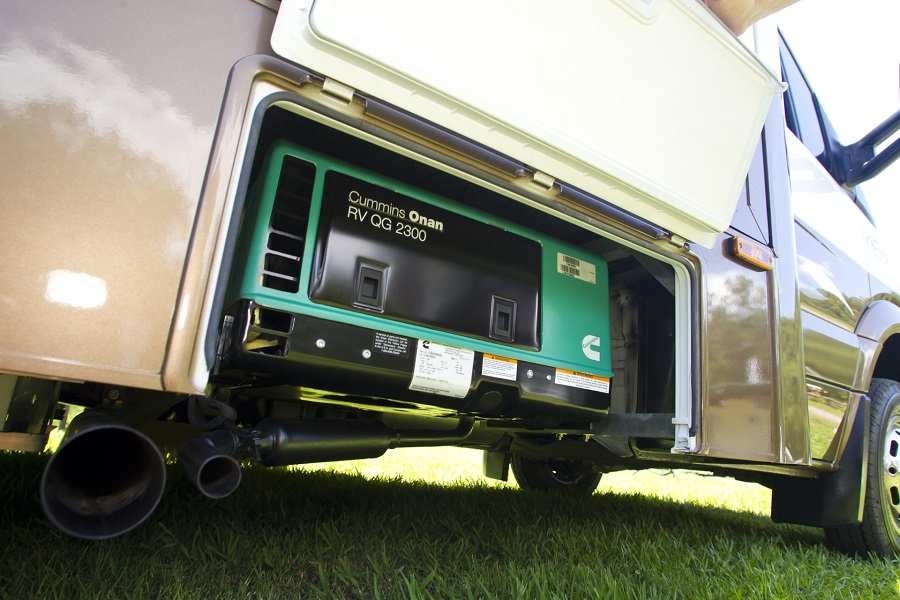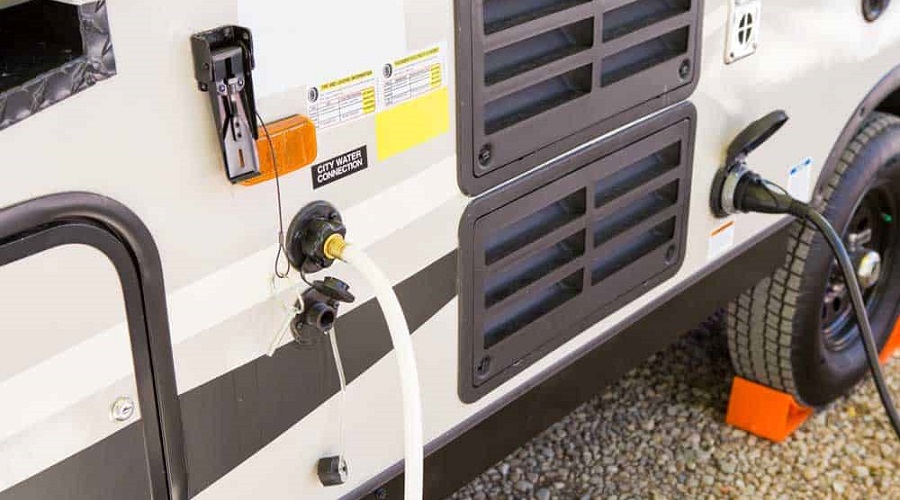RV fans are explorers who love traveling, enjoying new experiences, and meeting new people.
Life is fun on the road, but this lifestyle comes at a price. RVs are expensive vehicles to purchase and maintain, but you must keep them in good condition if you wish to continue living the good life.
Living a good RV life relies on driving a safe vehicle. RV tires are a critical part of the routine you need to keep your vehicle safe.
How long do RV tires last depends on the quality of the tire, your style of driving, and tire wear and tear? Understand how and why vehicle tires deteriorate, what signs to look for that confirm tires need changing, and what you can do to increase the lifespan of your RV tires.
Reasons for tire deterioration

How long RV tires last depend on how you take care of your vehicle’s tires.
Tire maintenance relies heavily on your driving style and how much you drive. If your RV is parked for months on end, the lack of use will also cause natural wear and tear.
Tires are made primarily from rubber, which predisposes them to degradation. Even if your RV has brand new tires that have been correctly aligned, rotated, and inflated, and you drive extensively, they will also undergo stress over time.
The main reason that tires degrade include:
- Standing for long periods
- Poor inflation of tires
- Incorrect alignment
- Improper rotation and balance
1. Standing for extended periods
Any vehicles that stand for long periods will experience tire degradation. The simple fact that the main component of tires is rubber means that this material will deteriorate.
Rubber is biodegradable, and even though tires are reinforced with other materials, they will stiffen and become brittle if unused. Tires undergo a vulcanization process during manufacturing which is a hardening process. Tires must go through this process to withstand the weight of vehicles and the heat friction of constant turning while driving.
Tires continue to age even when unused and undergo continuing vulcanization, oxidization, and water damage. Ultimately, the tire compounds deteriorate, making them unusable on the road.
2. Poor inflation of tires
How long do RV tires last also relies on correct tire inflation. Inflate your RV tires according to manufacturer instructions or run the risk of unnecessary deterioration. Poor or over-inflation of tires causes stress on the tire compounds, which increases gas usage.
Your RV tires also experience additional wear and tear when you use improper inflation. Poor or over-inflation of tires will impact their contact with road surfaces, ensuring an uneven weight distribution, causing the tire tread to wear unevenly.
3. Incorrect alignment
How long do RV tires last also depends on precision alignment. Checking RV tire alignment is a simple process. Choose a straight, quiet stretch of road to test this element.
Position the vehicle with the tires in a straight line, remove your hands from the steering wheel, and see whether it veers to the left or right. If the vehicle does shift, take it to the specialist to align the wheels correctly.
4. Improper rotation and balance
Regularly check your RVs tires for precision balancing and rotation. If the vehicle’s wheels rotate incorrectly and are out of balance, they develop scallops and uneven tread wear.
Scallops cause an uncomfortably bumpy ride, and imbalance causes uneven tread wear, both of which contribute to deterioration. Improper tire rotation and balance are also dangerous.
When to replace RV tires

RVs tires are so essential that your life and that of your passengers depend on them being in good condition.
Knowing when to replace RV tires is vital. Excellent tire tread translates into reasonable control over the vehicle, whether driving on decent roads or exploring beaten tracks.
Maintaining tires in good condition is imperative for all vehicles, but more so for a heavy one like the RV.
What should you be aware of when it comes to checking that your RV tires are in a premium condition for road trips?
1. Record keeping
To ensure that your tires last well, you should record how much maintenance you have invested in them. Keeping a record increases awareness of when you took the RV for balancing and rotation. Record keeping also shows you how often you align your tires.
Before going on any trip in your RV, take it in for a check-up. Ascertain whether the alignment is correct if the wheels are perfectly balanced and rotate precisely, and ensure you inflate the tires according to manufacturer specifications.
2. Timing
Even if RV tires typically last about three years, regular maintenance will improve their longevity. If you maintain your RV tires well and assume a stable driving style over excellent and poor roads, you can increase their lifespan by up to six years. Ultimately, excellent maintenance will make a difference in how long RV tires last.
3. Tire checks
Whenever you drive your RV, and it pulls to one side or feels unstable on the road, it is time to take it for a professional check-up. If you have driven over uneven roads or accidentally connected with a curb, you need to check the alignment. Any bumpy roads, minor tire collisions with objects indicate the need for attention to the tires.
Kicking the tires can give you an indication of whether they need additional or less air pressure. But rather than relying on an inconclusive test, use an air pressure gauge to inflate the tires to their correct specifications.
Always examine the tire tread before driving your RV. If you notice uneven wear at any point, the tires may need replacing. Slot a penny into several of the tire grooves to check their condition. If Lincoln’s head is still visible, replace the tires. If only a portion of Lincoln’s head is visible, there is still 2/32 of the one-inch tread to go on.
4. Safe tire tread depth
New tire tread depths are between 10/32 and 11/32 inches, which is an average of 8 to 9 mm. Tires wear at an average of 1/32 inches per 5,000 to 8,500 traveling miles, depending on the tire model. The lifespan of tires varies between 40,000 to 70,000 miles.
If your RV tire thread is 2/32 inches, you need to replace them urgently. If you see pieces of thread or metal sticking out of the tires or appear brittle, replace them. When you see from your records that your tires are approaching the 40,000 or 70,000 milestones, invest in new tires.
Tire condition is vital for your safety and the safety of other road users. Ensure you check your RV tires regularly, maintain an accurate record of tire maintenance, take your RV for professional care at least twice a year, and always check them before taking a road trip.
How to prolong RV tire life

On a positive note, how long do RV tires last depends on attention to tire care.
When you focus on a few vital issues, you can prolong RV tire life to six years or maybe even a little longer. Of course, the lifespan of the RV tires relies on how much you drive your RV, tire quality, how carefully you drive the vehicle, and tire checks.
Here are a few simple steps that you can take to prolong RV tires:
Maintain tire pressure
When you maintain tire pressure at the manufacturer’s suggestion levels, they will distribute pressure and heat evenly over road surfaces. Inflate your tires when cold, and do not over or underinflate them. Even distribution of tires helps extend the lifespan of the tires, giving you many more years of driving pleasure.
Install valve extenders for tire pressure
Tire valve pressure extenders make it easier to remove and replace the valves when inflating the tires. When a job is more accessible, you are more likely to keep a closer eye on tire pressure.
Sidewall inspection. Examine the RV tires for uneven tread wear. Inspect all the tires closely for any cracks or tears in the sidewalls, as poor tire condition is a safety risk. If the tire cracks or tears are more than 2/32 inches, they need replacing.
Check weight distribution
Pack your vehicle evenly, ensuring that the most load is on the sides of the vehicle as weight impacts tire wear. Even packing will help weight distribution on the tires. Also, ensure that you weigh the vehicle once loaded to determine even distribution and to determine that the RV is within its load-carrying parameters.
Record tire maintenance
Keeping a record of tire maintenance concerning rotation, inflation, and alignment is critical to the longevity of the RVs tires. Regular tire rotation also helps you check for faults, which you can attend to immediately.
Cover RV tire when not in use
When you store your RV for long periods, the tires deteriorate. Try to keep the tires off the ground when in storage and cover them. By taking this step, you relieve the pressure on the tires and prevent oil, water, and the weather from adding to their deterioration.
Conclusion
As this article clearly outlines, how long do RV tires last relies heavily on attention to their maintenance.
Once you appreciate how tires are affected by road use and the elements, you can take action to support the longevity of your RV tires.
When you know what tire checks to conduct, you increase safety awareness through the condition of the tires. Knowing how to prolong RV tire life saves money, improves your driving style, and supports responsibly living the RV life.
Resources:



